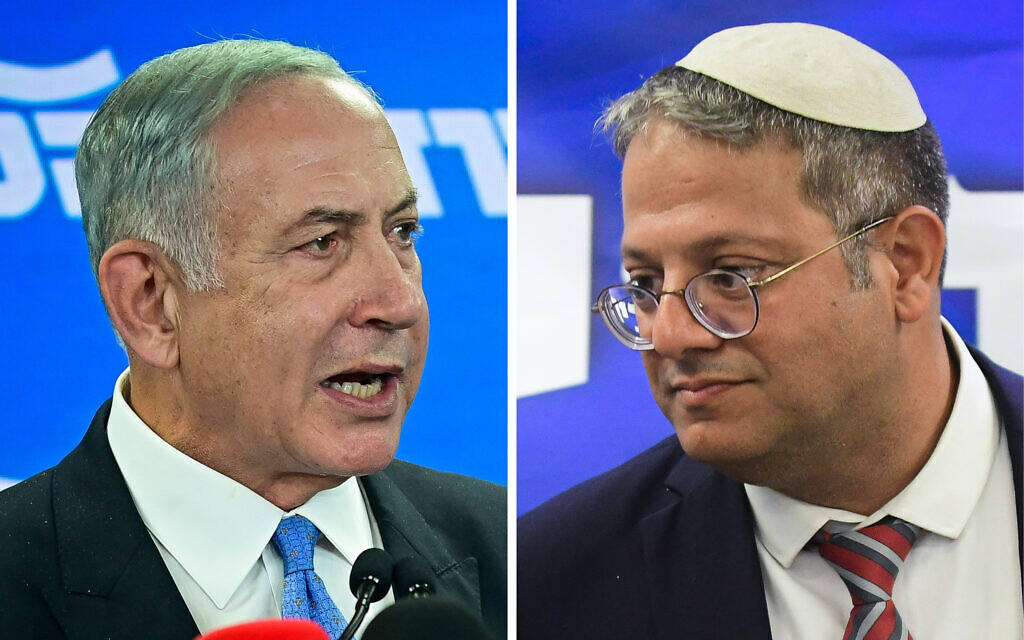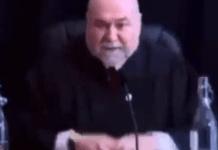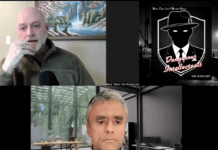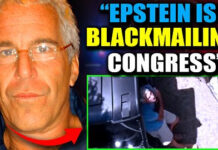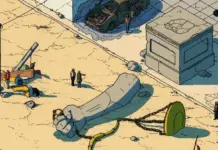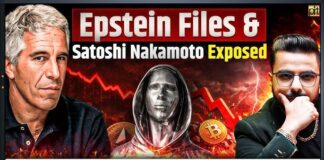By Natasha Roth-Rowland,
Benjamin Netanyahu is set to return as Israel’s prime minister, with Tuesday’s election results showing his Likud Party and far-right allies winning enough seats to form a parliamentary majority. This includes far-right lawmaker Itamar Ben-Gvir, who openly supports the ethnic cleansing of Palestinians, vows to crack down on the LGBTQ community and was once convicted of racist incitement against Arabs. “This is going to be a whole new level of power for the extreme right in the government,” says Natasha Roth-Rowland, editor and writer at +972 Magazine, who studies right-wing Jewish extremism.
Transcript
AMY GOODMAN: This is Democracy Now!, Democracynow.org, the War and Peace Report. I’m Amy Goodman. We begin today’s show in Israel where Benjamin Netanyahu is preparing to become prime minister again, 16 months after being ousted from office. Results from Tuesday’s election show Netanyahu’s Likud Party and its far-right allies won 64 seats in the Knesset, enough votes to form a parliamentary majority. Netanyahu served as prime minister from 1996 to 1999 and then again from 2009 to 2021. He is currently on trial for corruption.
A key member of his government will likely be Itamar Ben-Gvir, an ultra-nationalist lawmaker who openly supports the ethnic cleansing of Palestinians. In 2007, he was convicted of incitement to racism and supporting a terrorist organization. Ben-Gvir lives in an illegal settlement in the occupied West Bank. Last year, he relocated his parliamentary office to the Sheikh Jarrah neighborhood of Jerusalem where settlers have attempted to violently evict Palestinian residents from their homes. For years, Itamar Ben-Gvir hung a picture in his home of Baruch Goldstein, an Israeli-American who killed 29 Palestinians at a mosque in Hebron in 1994. The Jerusalem Post’s editor in chief described Ben-Gvir as “the modern Israeli version of an American white supremacist and a European fascist.”
The return of Netanyahu comes as Israeli security forces killed four Palestinians in the occupied West Bank and Jerusalem Thursday while Israeli fighter jets bombed Gaza. Israeli forces have killed at least 130 Palestinians in the West Bank this year. Many Palestinians fear the return of Netanyahu will only make things worse. This is Youssf Khattab, a resident of Gaza.
YOUSSF KHATTAB: [translated] None of the governments that were formed by Benjamin Netanyahu in the previous year gave the Palestinian people their rights. He was even rejecting all agreements with the Palestinian Authority. This upcoming government is an extreme right government. As a result, the Palestinian people will not witness anything but war, destruction, killing and more bloodshed, house demolitions, land uprooting, land confiscation and the building of more settlements.
AMY GOODMAN: We are joined now by Natasha Roth-Rowland. She is an editor and writer at +972 Magazine and a doctoral candidate in History at the University of Virginia. Her research and writing focuses on the Jewish far right in Israel-Palestine and the United States. Natasha, Welcome to Democracy Now! First of all, can you lay out the significance of this victory? And it is not only about Benjamin Netanyahu but who he is allied with, the parties that will make up his coalition and who they are.
NATASHA ROTH–ROWLAND: Certainly. The first thing to say really is that the election results from Tuesday are very, very grim. If you were watching the polls leading up to the elections, it sort of looked like it might be a bit of a tossup. It looked at some points as if Netanyahu’s bloc might get 61 seats, which is a very, very razor-thin margin in a Knesset of 120 seats. Sometimes it looked as if the so-called anti-Netanyahu bloc would get 61 seats. He has now landed a 64-seat majority, which is stronger than I think most people were anticipating.
And as you say, it is not just about Netanyahu himself returning to power, accompanied by this litany of criminal charges which may well be dispensed with if the incoming coalition gets its way with the judicial system. But it is also about Netanyahu’s allies. Chief among those, as you mentioned, is Itamar Ben-Gvir. He is he head of the Otzma Yehudit party which ran with religious Zionism in these elections and they brought in an unprecedented haul of 14 seats. That is the third largest party in the Knesset. This is going to be a whole new level of power for the extreme right in the government.
And the thing I’ll add to that is I think there is an understandable impulse to say that no matter who is in power in the Israeli government, not much changes. The occupation continues. Violence and surveillance against Palestinians inside the Green Line continue. Bombardments of Gaza continue. Everything we’ve seen in the past year is a gruesome testament to that. But unfortunately things can always get worse, and under what looks like the new government, they will get worse. The question is how much.
AMY GOODMAN: Tell us who Itamar Ben-Gvir is. In an October 1995 interview, he can be seen holding an ornament taken from Prime Minister Yitzhak Rabin’s car by far-right Israeli activists during a protest against Rabin and the Oslo Accords.
ITMAR BEN–GVIR: [translated] People managed to get to this symbol from Rabin’s Car. The symbol is a symbol, and it symbolizes that just as we got this symbol, we can get to Rabin.
AMY GOODMAN: That was Itamar Ben-Gvir in October 1995, so that was actually decades ago. A short time later, November 4th, 1995, a Jewish extremist assassinated Yitzhak Rabin in Tel Aviv. Your comment, Natasha?
NATASHA ROTH–ROWLAND: The first thing I want to make clear is that the assassin, Yigal Amir, was not part of the same youth movement that Itamar Ben-Gvir was, but they shared similar ideologies. Itamar Ben-Gvir at that time was a youth activist with the Kach movement. Kach was the extreme-right party founded by Meir Kahane, an American-born rabbi and ultranationalist who emigrated to Israel in the 1970s, formed this party and after a few unsuccessful attempts, managed to get elected to the Knesset in 1984. His party was banned from running in 1988 ostensibly due to its racist and antidemocratic platform, but the charge to ban it was actually led by other far-right parties who worried that Kach was going to begin nibbling away at their voter base.
Having said that, even though Kach was banned from running in elections, it stuck around as a political movement. It was outlawed in 1994 after the terror attack you mentioned by Baruch Goldstein where he murdered 29 Palestinians at prayer in Hebron. But it has continued to have this kind of coterie of core activists despite its banning as a terrorist organization in Israel-Palestine. So that was the context in which Itamar Ben-Gvir spoke to the media in that clip that we just saw.
He has maintained his views in the intervening decades. He had this photograph of Goldstein on his living room wall for decades. He was finally convinced to take it down in 2020 by some of his partners who he was running in elections with. He has since recanted his earlier statements that he sees Goldstein as a hero and as a defender of the Jewish people. It is my view that those statements are not to be taken seriously. I think they fit in the same bucket as his supposed moderation of his views on Palestinians and any kind of liberal vision for what Israel-Palestine should look like. One of his own party activists was caught on camera admitting that his apparent moderation of his views was just a ploy to make sure that he did not get struck from being able to run for the Knesset.
And that is who we have at the top of a faction, number two just to Bezalel Smotrich who is the head of religious Zionism, that Otzma Yehudit ran with. That’s who we have coming into the Knesset as a potential kingmaker. The ministry that he is seeking and may well get is minister of public security. That puts him in charge of the police and the prospects for that I think are frightening.
AMY GOODMAN: Although you say he recanted, I wanted to go back to a decade ago, July 2011, when Ben-Gvir told a reporter why he chose to put that photograph of Goldstein on the wall of his home.
ITAMAR BEN–GVIR: [translated] He is a righteous man. He’s a hero. This is a doctor who saved Jews throughout his life.
AMY GOODMAN: How much power does he have today? Talk about what this means, what Netanyahu has had in the past and who he is with today. Also the fact that Itamar Ben-Gvir relocated his parliamentary office to the Sheikh Jarrah neighborhood of Jerusalem and the significance of what that means.
NATASHA ROTH–ROWLAND: The relocation to Sheikh Jarrah was somewhat of a political stunt. Ben-Gvir has really followed his mentor, Meir Kahane, which is being very I should maybe say astute in figuring out where the hot spot of tension is at any given time in Israel-Palestine and descending on it. It wasn’t a permanent relocation; it was sort of a desk with a banner above it. But it was intended to incite tensions and confrontations and he was successful in doing so.
Now, as a coalition partner to Netanyahu, it remains to be seen what aspects of his party’s platform he is able to push forward. I think in terms of assisting Netanyahu, as I said before, the attacks on the judiciary which are intended to get Netanyahu off the hook in his various corruption trials I think is a very likely prospect. Ben-Gvir himself wants to encourage emigration—I’ll put that in [inaudible] commas—emigration of Palestinians from within Israel-Palestine on both sides of the Green Line. He wants to make it much easier for Israeli security forces to punish, I should say, Palestinians on both sides of the Green Line with minimal repercussions. There is already a great deal of impunity enjoyed by soldiers and police officers acting against Palestinians. He wants to make that impunity even broader.
He wants to, in his own words, crack down on Reform Jews. There were some easing of processes for conversion and so on regarding Reform Jews in Israel-Palestine over the past year. Those look set to be rolled back. His party looks set to attack the LGBTQ community. They want to reverse the ban on so-called conversion therapy. And just yesterday, the head of the Noam party which is part of the religious Zionism slate that won 14 seats in this last election said that he wants to try and legally ban pride parades.
AMY GOODMAN: Back on that issue of Sheikh Jarrah, I wanted to play a clip of Ben-Gvir, this is just last month, waving a gun and shouting during a confrontation in this neighborhood.
ITAMAR BEN–GVIR: [translated] If they, Palestinians, throw stones, shoot them.
AMY GOODMAN: “Shoot them,” he said. This is Mahmoud Sa’u, a Palestinian who lives in Sheikh Jarrah, describing Itamar Ben-Gvir’s actions in his neighborhood.
MAHMOUD SA’U [translated] His field office is within the plan to take over Jerusalem Sheikh Jarrah neighborhood and the houses there. He sets up his tent here and starts pointing at houses that he wants to take. My house is under threat. My neighbor’s house is also under threat. We all receive eviction orders or courts to increase in rent, also orders not to build or renovate. He used to come here and make trouble for everyone. Imagine a Knesset member pulling out his gun towards the people in the neighborhood. We have children and women here. So what do you expect from him if they assigned him as the minister of public security or any ministerial position? Of course he will be more confident and relieved. But as my neighbor said, we don’t care. Even if he was a prime minister, we are staying in her houses here. This is our legitimate right to defend our houses and children.
AMY GOODMAN: Natasha Roth-Rowland, Haaretz ran an editorial titled Kahanism Won. Israel Is Now Closing in on a Right-wing, Religious, Authoritarian Revolution. Explain also overall what this means. Lara Friedman, the President of the Foundation for Middle East Peace, tweeted Wednesday, “Reminder: six months before the Israeli election that made Kahanists arguably the most powerful political force in Israel, the Biden administration decided to do its part in normalizing Kahanism by removing Kahanist groups from the U.S. list of foreign terrorist organizations, where they’d been listed for decades.” Which also, by the way, goes to the conviction of Ben-Gvir for being part of a terrorist organization and for racism. If you could respond to all of that?
NATASHA ROTH–ROWLAND: In terms of what Lara Friedman tweeted about the State Department removing Kach and Kahane Chai from—Kahane Chai, I’m sorry, is a sort of offshoot of Kach that emerged in the wake of Meir Kahane’s assassination in 1990—I think what Lara Friedman is saying is absolutely correct. And I don’t think it is the State Department alone that has played a role in this normalization that she discusses. I think it is certainly unhelpful that these two groups were removed from that designation six months ago because I think that has contributed to this idea that Kahanism and Kach and Kahanist ideology are somehow relics of the past or sufficiently marginal that they don’t merit close monitoring and surveillance, and I think all of that is incorrect.
I think it is also of a piece with a wider marginalization of Ben-Gvir and Kahanism that I think will unavoidably be revisited now but that has played a big role in downplaying the threat posed by his ideology and its potential to win power in the Israeli government. I think if we want to put things into a little bit of more familiar context for watchers here in the U.S., the effect has been a little bit like what happened with Trump during his rise to power before becoming elected president. There were these kind of parallel forces where he was dismissed and ridiculed as an extremist but also a bit of a joke who never stood a chance of coming to power. But at the same time, he received such an intense media spotlight that he won the kind of coverage that most politicians I think can only dream of.
The same thing happened with Ben-Gvir in Israel-Palestine. He was so long dismissed as an unpleasant, horrendous but marginal phenomenon but the second that he got into the Knesset, he started being invited repeatedly onto Israeli news shows. There is a statistic from earlier this year that said within a given period, he was only second to Prime Minister Naftali Bennett in terms of airtime that he received on the Israeli media. So I think those two things have really combined to push him into this place were he has enjoyed greater exposure than ever, which rather than turning people off him has actually won supporters to him and his party. And all of the kind of marginalization and dismissal of the threat that he poses has actually backfired because now he will be going into a governing coalition near the top of the third most powerful party in the coalition and may very well be in charge of the police forces, as we said.
AMY GOODMAN: Natasha Roth-Rowland, we want to thank you so much for being with us, editor and writer at +972 Magazine, doctoral candidate in History at the University of Virginia. Her research focusing on the Jewish far right in Israel-Palestine and the United States.
Coming up, we look at how New York immigrant rights advocates are supporting thousands of asylum-seekers sent to the city on buses from Texas and other states. Stay with us.
Disclaimer: We at Prepare for Change (PFC) bring you information that is not offered by the mainstream news, and therefore may seem controversial. The opinions, views, statements, and/or information we present are not necessarily promoted, endorsed, espoused, or agreed to by Prepare for Change, its leadership Council, members, those who work with PFC, or those who read its content. However, they are hopefully provocative. Please use discernment! Use logical thinking, your own intuition and your own connection with Source, Spirit and Natural Laws to help you determine what is true and what is not. By sharing information and seeding dialogue, it is our goal to raise consciousness and awareness of higher truths to free us from enslavement of the matrix in this material realm.
 EN
EN FR
FR

